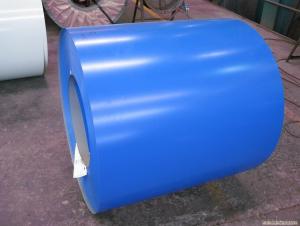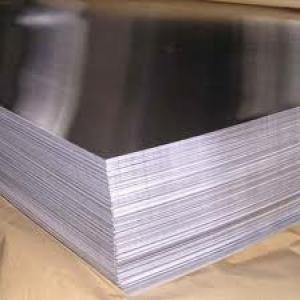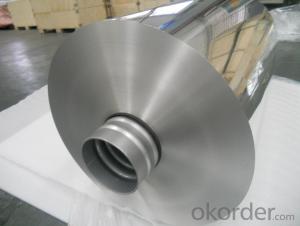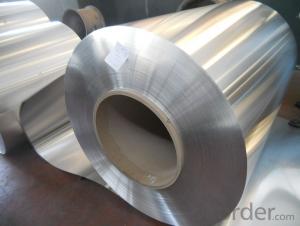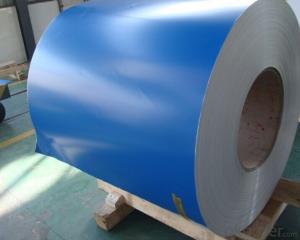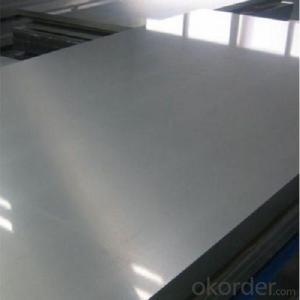Hot Rolled Aluminium Coils for Color Coated
- Loading Port:
- Shanghai
- Payment Terms:
- TT OR LC
- Min Order Qty:
- 5 m.t.
- Supply Capability:
- 20000 m.t./month
OKorder Service Pledge
OKorder Financial Service
You Might Also Like
Item specifice
1.Structure of Hot Rolled Aluminium Coils for Color Coated
Hot Rolled Aluminium Coils for Color Coated is one semi-finished aluminium material. This strip can be rolled down to aluminium coil,sheet,circle ect. The alloy AA1050 is widly used in building, industry ect. Its weight is much lower than steel. So many customers choosed aluminium material instead of steel.
2. Main features of Hot Rolled Aluminium Coils for Color Coated
a.Competitive price---We have our own mills and can produce mill finished aluminium coils, so we can control the production cost better.
b.Professional after-sale service---We have more than 15 years exportation experience and you need not worry about the exporation problems.
c.Fast delivery time---We can control the delivery time within 35 days.
3. Image of Hot Rolled Aluminium Coils for Color Coated
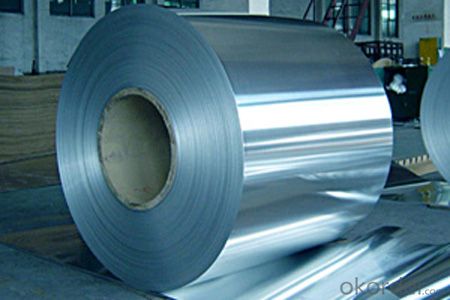
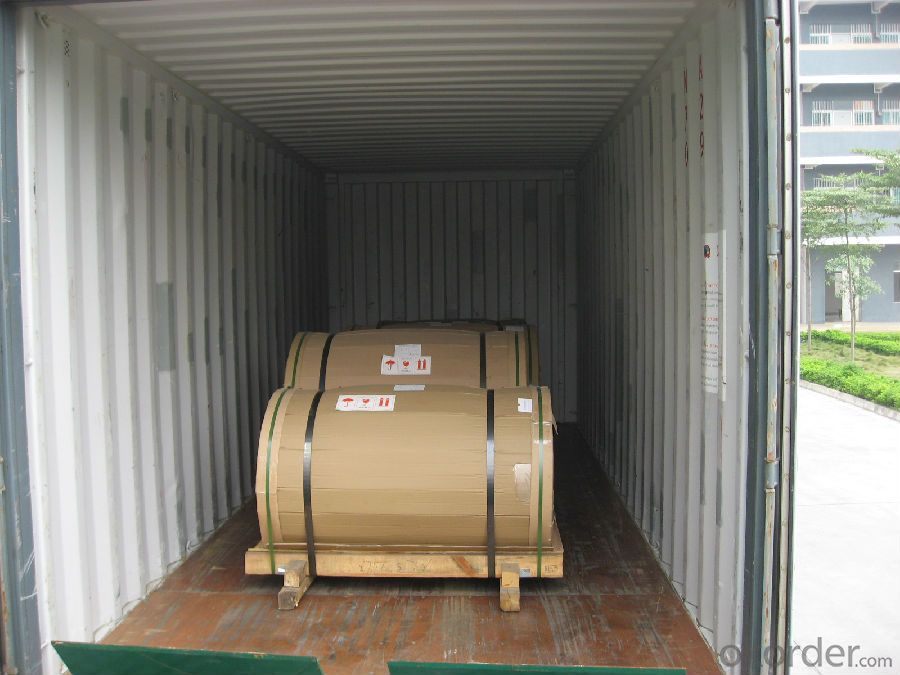
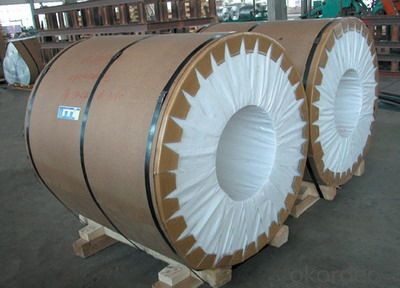
4. Product Specification of Hot Rolled Aluminium Coils for Color Coated
| Alloy | Temper | Style | Thickness | Width |
| AA1100 | H14 | Direct Casting | 0.2mm-3mm | 1000mm-1500mm |
5.FAQ of Hot Rolled Aluminium Coils for Color Coated
What is the quality standard?
---Usually our standard is GB3880-2006
What is the largest width?
---It is 2300mm
What is the MOQ?
---Usually we can accept 80 tons.
- Q:Can aluminum sheets be painted or coated?
- Yes, aluminum sheets can be painted or coated. Aluminum surfaces can be prepared and primed before applying paint or a protective coating. The paint or coating adheres well to the aluminum surface, providing a durable and aesthetically pleasing finish.
- Q:Are aluminum sheets suitable for HVAC applications?
- Yes, aluminum sheets are suitable for HVAC applications. Aluminum is a lightweight, durable, and corrosion-resistant material, making it ideal for use in heating, ventilation, and air conditioning systems. It offers excellent thermal conductivity, allowing for efficient heat transfer, and can be easily formed and fabricated to meet specific requirements in HVAC installations. Additionally, aluminum is also environmentally friendly as it can be recycled, making it a sustainable choice for HVAC applications.
- Q:Can aluminum sheets be an alternative to plastic in certain applications?
- Yes, aluminum sheets can indeed be an alternative to plastic in certain applications. Aluminum is a highly versatile and sustainable material that offers several advantages over plastic, such as being more durable, resistant to UV rays, and having a longer lifespan. Additionally, aluminum is recyclable and can be reused indefinitely, making it a more environmentally friendly choice. However, the suitability of aluminum sheets as an alternative to plastic would depend on the specific application and requirements.
- Q:Do 101 aluminum sheets have any specific certifications or standards?
- Yes, 101 aluminum sheets typically have certifications and standards that ensure their quality and performance. These may include certifications like ASTM (American Society for Testing and Materials) and standards such as AA (Aluminum Association) standards, which verify the material's composition, mechanical properties, and manufacturing processes. Additionally, specific industry certifications like ISO 9001 (International Organization for Standardization) may be applicable to ensure consistent quality control during production.
- Q:Is aluminum sheet resistant to UV rays?
- Yes, aluminum sheet is resistant to UV rays.
- Q:Can aluminum sheets be easily shaped or bent?
- Indeed, aluminum sheets possess a remarkable capability to be effortlessly molded or flexed. Renowned for its exceptional malleability and ductility, aluminum exhibits a remarkable propensity to be readily fashioned into diverse contours and curves. The manipulation of this versatile metal can be accomplished through an assortment of techniques, encompassing rolling, pressing, and even manual utilization of tools. Given its pliability, aluminum emerges as the preferred choice within industries such as automotive, aerospace, and construction, wherein the fabrication of intricate shapes and bends is a common necessity. Moreover, the lightweight nature and inherent resistance to corrosion further enhance aluminum's suitability for shaping and bending endeavors.
- Q:Can aluminum sheets handle high temperatures?
- Certainly! High temperatures are well-tolerated by aluminum sheets. With a melting point of 660 degrees Celsius (1220 degrees Fahrenheit), aluminum proves itself suitable for various applications requiring elevated temperatures. Furthermore, aluminum possesses exceptional thermal conductivity, enabling rapid heat dissipation. This attribute renders aluminum sheets ideal for deployment in environments necessitating resistance against high temperatures, including engine components, heat exchangers, and oven linings. Nevertheless, it is crucial to take into account the specific alloy and thickness of the aluminum sheet, as different alloys may impose different temperature thresholds.
- Q:Are aluminum sheets suitable for electronic components?
- Yes, aluminum sheets are suitable for electronic components. Aluminum is commonly used in the production of electronic components due to its excellent conductive properties, lightweight nature, and high thermal conductivity. It is often utilized in circuit boards, heat sinks, and enclosures for electronic devices.
- Q:How do you prevent galvanic corrosion when using aluminum sheets with other metals?
- To prevent galvanic corrosion when using aluminum sheets with other metals, there are several measures that can be taken: 1. Use a protective coating: Applying a protective coating, such as paint or anodizing, on the aluminum surface can create a barrier between the aluminum and other metals, preventing direct contact and reducing the risk of galvanic corrosion. 2. Insulate the metals: Placing a non-conductive insulating material, such as rubber or plastic, between the aluminum and other metals can help isolate them and prevent galvanic corrosion. 3. Choose compatible metals: Selecting metals that are less prone to galvanic corrosion when in contact with aluminum can reduce the risk. For example, stainless steel, titanium, or other corrosion-resistant alloys are often preferred when working with aluminum sheets. 4. Use dielectric materials: Inserting a dielectric material, such as nylon or Teflon washers, between the aluminum and other metals can act as a barrier and inhibit the flow of electrical current, thereby preventing galvanic corrosion. 5. Control the environment: Avoiding environments with high moisture levels or extreme temperature variations can help reduce the likelihood of galvanic corrosion. Proper ventilation and moisture control can also play a significant role in preventing this type of corrosion. It is important to note that the best preventive measures may vary depending on the specific application and the types of metals involved. Consulting with a materials engineer or corrosion specialist can provide valuable guidance in selecting the most appropriate strategies to prevent galvanic corrosion in a particular scenario.
- Q:Are 101 aluminum sheets suitable for chemical processing equipment?
- Chemical processing equipment should not employ 101 aluminum sheets due to their unsuitability. Although aluminum is a versatile and extensively utilized material, its use is not advisable when dealing with potent acids or bases. Aluminum is prone to corrosion when exposed to certain chemicals, jeopardizing the equipment's integrity and potentially causing leaks or other safety risks. Therefore, it is advisable to opt for materials explicitly engineered and produced to endure the corrosive impacts of the chemicals employed in chemical processing equipment.
1. Manufacturer Overview |
|
|---|---|
| Location | |
| Year Established | |
| Annual Output Value | |
| Main Markets | |
| Company Certifications | |
2. Manufacturer Certificates |
|
|---|---|
| a) Certification Name | |
| Range | |
| Reference | |
| Validity Period | |
3. Manufacturer Capability |
|
|---|---|
| a)Trade Capacity | |
| Nearest Port | |
| Export Percentage | |
| No.of Employees in Trade Department | |
| Language Spoken: | |
| b)Factory Information | |
| Factory Size: | |
| No. of Production Lines | |
| Contract Manufacturing | |
| Product Price Range | |
Send your message to us
Hot Rolled Aluminium Coils for Color Coated
- Loading Port:
- Shanghai
- Payment Terms:
- TT OR LC
- Min Order Qty:
- 5 m.t.
- Supply Capability:
- 20000 m.t./month
OKorder Service Pledge
OKorder Financial Service
Similar products
New products
Hot products
Related keywords
